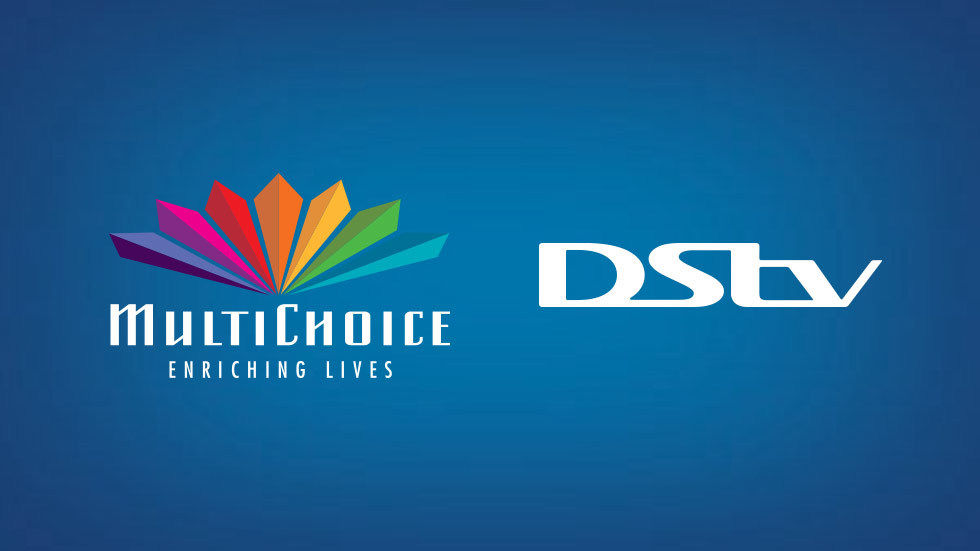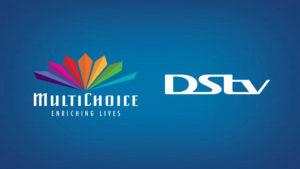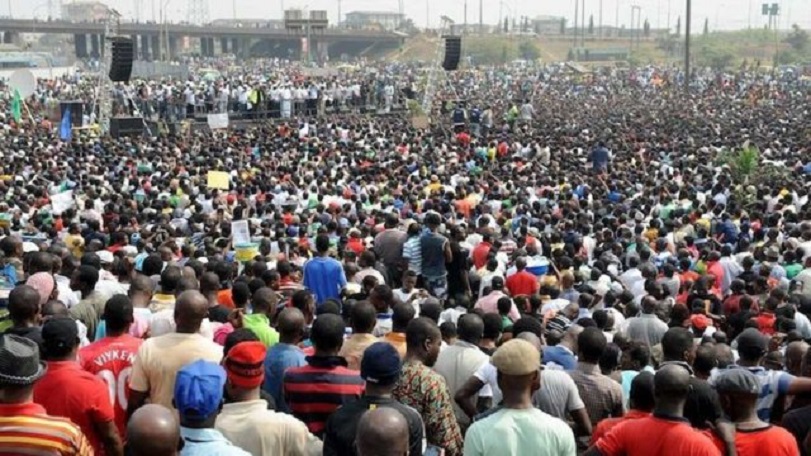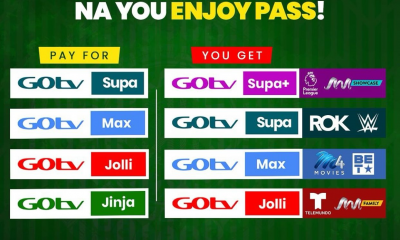Technology
MultiChoice May Increase DSTV Subscription Fees


By Dipo Olowookere
Nigerians may have to start gearing up to pay more in this harsh economy if they wish to continue accessing television contents from popular PayTV provider, DSTV.
This hint was dropped recently by the General Manager, Sales and Marketing of MultiChoice Nigeria, Mr Martin Maputo.
MultiChoice Nigeria is the parent company of DSTV, which has provided interesting contents to Nigerians for many years, including the English Premier League (EPL).
Checks by Business Post revealed that since the country went into recession, some Nigerians have found it difficult to do some things, including paying for monthly DSTV subscriptions and others.
Prices of goods in the market have skyrocketed especially due to the exchange rate of the Naira against the Dollar, forcing some to cut down on their spending. Jobs have been lost during the period and some companies forced to lay off workers.
Speaking recently, Mr Maputo warned that subscription fees in Nigeria may go up if the foreign exchange (forex) problem facing the country was not addressed by the government.
He said currently, DStv is trying as much as possible to avoid any price increase but instead concentrating on upgrading its contents across all bouquets, but maintained that if government fails to curtail the forex crisis, which has made it more expensive for the company to buy foreign content, especially the EPL, it might be forced to consider price increase.
“Most of the content we buy such as EPL and others from abroad are dominated in Pounds and Dollars.
“So, we are not only operating in the market but also responding to the market. At this stage, we are trying as much as we can to avoid any price increase but if there is nothing done to curtail the forex issues, we might be forced to increase (our subscription fees),” Mr Maputo said in Lagos while unveiling new content upgrade on all DStv bouquets.
Business Post learned that Mr Maputo’s warning is coming when MultiChoice has already reduced subscription rates in other African countries.
From November 1, 2016, Kenya, Zimbabwe, Malawi and other countries in Africa started paying reduced monthly subscription fees on DStv and GOtv bouquets.
According to the Nation, his may be a response to the harsh economic realities sweeping across the continent.
For example in Uganda, the company announced about 15 percent cut in subscription fees, in a move to entice more customers amid weak economic realities.
MultiChoice Uganda Public Relations and Communications Manager, Ms Tina Wamala, was quoted to have said, “We are facing hard economic times not just as a company but also our customers,” just as its General Manager, Mr Charles Hamya, was also quoted to have explained in a statement that, “This significant price drop, coupled with the major boost in entertainment value across all DStv bouquets demonstrates our commitment to ensuring DStv customers receive the best possible access to great entertainment and outstanding value.”
Also in Malawi, MultiChoice announced a drop in DStv subscription rates.
It was reported that under the reduction regime, DStv Premium in Malawi is down to K55,600 from K61,100, Compact Plus is at K35,700 from K42,000, Compact is at K22,300 from K23,800 while Family is reduced to K12,700 from K16,700.
“MultiChoice’s priority is to put customers at the heart of our business and that is why the whole of this year, despite the economic challenges the country is facing, we did not increase our subscription prices.
“It’s been 20 years that we have been doing business in Malawi and we strive to do business differently and that is why tonight’s press briefing is named ‘Business Unusual’,” its Marketing Manager, Chimwemwe Nyirenda, was quoted by the Nation to have said during a press briefing at Atmosphere Restaurant in Blantyre.
However in South Africa, the home country of the company, there would not be a hike in the subscription fee.
“We review the DStv prices once a year when we do our business planning – our prices for next year will be announced before April 1, 2017.
“When reviewing our packages and pricing in each country, we take into account local dynamics such as inflation, content costs, foreign exchange rates, local taxes and overheads required for each business.
“We’ve done a lot of research into what pay-TV costs in other parts of the world, and we believe that DStv offers good value for money in the countries in which it operates.
“In South Africa, we’ve implemented a number of cost-saving options for our customers – those who pay annually receive one month free, and our Price Lock packages enable customers to freeze their package price for two years,” MultiChoice South Africa reportedly said.
The Nation also reports that “the firm is alleged to be making an average of about N8 billion from its over 4 million subscribers every month in Nigeria and about N80 billion as turnover per year.”
Business Post recalls that in April 2015, Nigerians vehemently kicked against hike in the subscription fees of DSTV.
The matter even went to court and a Federal High Court sitting in Lagos restrained MultiChoice Nigeria Limited from going on with its new rates and increase in tariffs payable by its subscribers across board.
The restraining order was given by Justice C.J. Aneke following a suit filed, with number FHC/L/CS/404/2015, by two Lagos-based lawyers, Mr Osasuyi Adebayo and Oluyinka Oyeniji.
Technology
Expert Reveals Top Cyber Threats Organisations Will Encounter in 2026

By Adedapo Adesanya
Organisations in 2026 face a cybersecurity landscape markedly different from previous years, driven by rapid artificial intelligence adoption, entrenched remote work models, and increasingly interconnected digital systems, with experts warning that these shifts have expanded attack surfaces faster than many security teams can effectively monitor.
According to the World Economic Forum’s Global Cybersecurity Outlook 2026, AI-related vulnerabilities now rank among the most urgent concerns, with 87 per cent of cybersecurity professionals worldwide highlighting them as a top risk.
In a note shared with Business Post, Mr Danny Mitchell, Cybersecurity Writer at Heimdal, said artificial intelligence presents a “category shift” in cyber risk.
“Attackers are manipulating the logic systems that increasingly run critical business processes,” he explained, noting that AI models controlling loan decisions or infrastructure have become high-value targets. Machine learning systems can be poisoned with corrupted training data or manipulated through adversarial inputs, often without immediate detection.
Mr Mitchell also warned that AI-powered phishing and fraud are growing more sophisticated. Deepfake technology and advanced language models now produce convincing emails, voice calls and videos that evade traditional detection.
“The sophistication of modern phishing means organisations can no longer rely solely on employee awareness training,” he said, urging multi-channel verification for sensitive transactions.
Supply chain vulnerabilities remain another major threat. Modern software ecosystems rely on numerous vendors and open-source components, each representing a potential entry point.
“Most organisations lack complete visibility into their software supply chain,” Mr Mitchell said, adding that attackers frequently exploit trusted vendors or update mechanisms to bypass perimeter defences.
Meanwhile, unpatched software vulnerabilities continue to expose organisations to risk, as attackers use automated tools to scan for weaknesses within hours of public disclosure. Legacy systems and critical infrastructure are especially difficult to secure.
Ransomware operations have also evolved, with criminals spending weeks inside networks before launching attacks.
“Modern ransomware operations function like businesses,” Mitchell observed, employing double extortion tactics to maximise pressure on victims.
Mr Mitchell concluded that the common thread across 2026 threats is complexity, noting that organisations need to abandon the idea that they can defend against everything equally, as this approach spreads resources too thin and leaves critical assets exposed.
“You cannot protect what you don’t know exists,” he said, urging organisations to prioritise visibility, map dependencies, and focus resources on the most critical assets.
Technology
NCC Begins Review of National Telecommunications Policy After 26 Years

By Adedapo Adesanya
In a consultation paper released to the public, the commission said it is seeking input from stakeholders, including telecom operators, tech companies, legal experts, and the general public, on proposed revisions designed to reposition Nigeria’s telecommunications framework to match current digital demands. Submissions are expected by March 20, 2026.
The NTP 2000 marked a turning point in Nigeria’s telecom landscape. It replaced the 1998 policy, introducing full liberalisation and a unified regulatory framework under the NCC, and paved the way for the licensing of GSM operators such as MTN, Econet (now Airtel), and Globacom in 2001 and 2002.
Prior to the NTP, the sector was dominated by Nigerian Telecommunications Limited (NITEL), a government-owned monopoly plagued by obsolete equipment, low teledensity, and poor service. At the time, Nigeria had fewer than 400,000 telephone lines for the entire country.
However, the NCC noted that just as the 1998 policy was overtaken by global developments, the 2000 framework has become structurally misaligned with today’s telecom reality, which encompasses broadband, 5G networks, satellite internet, artificial intelligence, and a thriving digital economy worth billions of dollars.
“The rapid pace of technological change and emerging digital services necessitate a comprehensive update to ensure the policy continues to support economic growth while protecting critical infrastructure,” the Commission stated.
The review will target multiple chapters of the policy. Key revisions include: Enhancements on online safety, content moderation, digital services regulation, and improved internet exchange protocols; a modern framework for satellite harmonisation, coexistence with terrestrial networks, and clearer spectrum allocation to boost service quality, and policies to address fiscal support, reduce multiple taxation, and lower operational costs for operators.
The NCC is also proposing entirely new sections to the policy to address emerging priorities. Among the key initiatives are clear broadband objectives aimed at achieving 70 per cent national broadband penetration, with a focus on extending connectivity beyond urban centres to reach rural communities.
The review also seeks to formally recognise telecom infrastructure, including fibre optic cables and network masts, as Critical National Infrastructure to prevent vandalism and enhance security.
In addition, the commission is targeting the harmonisation of Right-of-Way charges across federal, state, and local governments, alongside the introduction of a one-stop permitting process for telecom deployment, designed to reduce bureaucratic delays and lower operational costs for operators.
According to the NCC, the review aims to make fast and affordable internet widely accessible. “The old framework was largely voice-centric. Today, data is the currency of the digital economy,” the commission said, highlighting the need to close the urban-rural broadband divide.
The consultation process is intended to gather diverse perspectives to ensure the updated policy reflects current technological trends, market realities, and consumer needs. By doing so, the NCC hopes to maintain the telecommunications sector’s role as a key driver of economic growth and digital inclusion.
Technology
FG to Scrutinise MTN’s $2.2bn Full Take Over of IHS Towers

By Adedapo Adesanya
The Minister of Communications, Innovation and Digital Economy, Mr Bosun Tijani, says the Nigerian government is assessing MTN Group’s acquisition of IHS Towers to ensure the deal aligns with Nigeria’s telecommunications development goals.
On Tuesday, MTN Group said it has agreed to acquire the remaining 75.3 per cent stake in IHS Holding Limited in an all-cash deal valued at $2.2 billion. The deal will be funded through the rollover of MTN’s existing stake of around 24 per cent in IHS, as well as about $1.1 billion in cash from MTN, roughly $1.1 billion from IHS’s balance sheet, and the rollover of no more than existing IHS debt.
Mr Tijani, in a statement, said the administration of President Bola Tinubu has spent the past two years strengthening the telecom sector through policy clarity, regulatory support, and engagement with industry stakeholders, boosting investor confidence and sector performance.
“Recent financial results from key operators show improved profitability, increased investment in telecoms infrastructure, and operational stability across the sector,” he said.
“These gains reflect the resilience of the industry and the impact of government reforms.”
The minister added that telecommunications infrastructure is critical for national security, economic growth, financial services, innovation, and social inclusion.
“We will undertake a thorough assessment of this development with relevant regulatory authorities to review its impact on the sector,” Mr Tijani said.
He added that the review aims to ensure market consolidation or structural changes, protect consumers, safeguard investments, and preserve the long-term sustainability of the telecom industry.
Mr Tijani also said the government remains committed to maintaining a stable and forward-looking policy environment to keep Nigeria’s telecommunications sector strong and sustainable, in line with the administration’s broader digital economy vision.
Upon completion, the transaction will see MTN transition from being a minority shareholder in IHS to a full owner. It will also see IHS exit from the New York Stock Exchange and become a wholly owned subsidiary of MTN.
For MTN, the deal represents a decisive shift as data demand surges and digital infrastructure becomes increasingly strategic with a booming digitally-oriented youth population on the continent.
-

 Feature/OPED6 years ago
Feature/OPED6 years agoDavos was Different this year
-
Travel/Tourism10 years ago
Lagos Seals Western Lodge Hotel In Ikorodu
-

 Showbiz3 years ago
Showbiz3 years agoEstranged Lover Releases Videos of Empress Njamah Bathing
-

 Banking8 years ago
Banking8 years agoSort Codes of GTBank Branches in Nigeria
-

 Economy3 years ago
Economy3 years agoSubsidy Removal: CNG at N130 Per Litre Cheaper Than Petrol—IPMAN
-

 Banking3 years ago
Banking3 years agoSort Codes of UBA Branches in Nigeria
-

 Banking3 years ago
Banking3 years agoFirst Bank Announces Planned Downtime
-

 Sports3 years ago
Sports3 years agoHighest Paid Nigerian Footballer – How Much Do Nigerian Footballers Earn






















